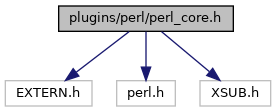#include <EXTERN.h>#include <perl.h>#include <XSUB.h>
Wykres zależności załączania dla perl_core.h:

Ten wykres pokazuje, które pliki bezpośrednio lub pośrednio załączają ten plik:

Idź do kodu źródłowego tego pliku.
Definicje | |
| #define | PERL_CORE_H |
| #define | fix(s) ((s) ? (s) : "") /* xmalloc.h */ |
| #define | new_pv(a) newSVpv(fix(a), xstrlen(a)) |
| #define | is_hvref(o) ((o) && SvROK(o) && SvRV(o) && (SvTYPE(SvRV(o)) == SVt_PVHV)) |
| #define | hvref(o) (is_hvref(o) ? (HV *)SvRV(o) : NULL) |
| #define | PERL_HANDLER_HEADER(x) |
| #define | RESTORE_ARGS(x) |
| #define | PERL_HANDLER_FOOTER() |
| #define | fix(s) ((s) ? (s) : "") /* xmalloc.h */ |
| #define | new_pv(a) newSVpv(fix(a), xstrlen(a)) |
| #define | is_hvref(o) ((o) && SvROK(o) && SvRV(o) && (SvTYPE(SvRV(o)) == SVt_PVHV)) |
| #define | hvref(o) (is_hvref(o) ? (HV *)SvRV(o) : NULL) |
| #define | PERL_HANDLER_HEADER(x) |
| #define | RESTORE_ARGS(x) ; |
| #define | PERL_HANDLER_FOOTER() |
Funkcje | |
| int | perl_initialize () |
| int | perl_finalize () |
| SV * | create_sv_ptr (void *object) |
Dokumentacja definicji
◆ fix [1/2]
◆ fix [2/2]
◆ hvref [1/2]
◆ hvref [2/2]
◆ is_hvref [1/2]
| #define is_hvref | ( | o | ) | ((o) && SvROK(o) && SvRV(o) && (SvTYPE(SvRV(o)) == SVt_PVHV)) |
◆ is_hvref [2/2]
| #define is_hvref | ( | o | ) | ((o) && SvROK(o) && SvRV(o) && (SvTYPE(SvRV(o)) == SVt_PVHV)) |
◆ new_pv [1/2]
◆ new_pv [2/2]
◆ PERL_CORE_H
| #define PERL_CORE_H |
◆ PERL_HANDLER_FOOTER [1/2]
| #define PERL_HANDLER_FOOTER | ( | ) |
Wartość:
PUTBACK;\
/* perl_retcount = perl_call_sv(func, G_EVAL|G_DISCARD);*/\
perl_retcount = perl_call_pv(fullproc, G_EVAL);\
SPAGAIN;\
if (SvTRUE(ERRSV)) {\
error = SvPV(ERRSV, PL_na);\
print("script_error", error);\
ret = SCRIPT_HANDLE_UNBIND;\
}\
else if (perl_retcount > 0)\
{\
perl_ret = POPs;\
ret = SvIV(perl_ret);\
}\
RESTORE_ARGS(0);\
/* debug("%d %d\n", ret, perl_retcount); */\
\
PUTBACK;\
FREETMPS;\
LEAVE;\
\
if (ret < 0) return -1;\
else return ret; \
} /* closing tag defined in PERL_HANDLER_HEADER() macro */ \
xfree(fullproc);
◆ PERL_HANDLER_FOOTER [2/2]
| #define PERL_HANDLER_FOOTER | ( | ) |
Wartość:
PUTBACK;\
/* perl_retcount = perl_call_sv(func, G_EVAL|G_DISCARD);*/\
perl_retcount = perl_call_pv(fullproc, G_EVAL);\
SPAGAIN;\
if (SvTRUE(ERRSV)) {\
error = SvPV(ERRSV, PL_na);\
print("script_error", error);\
ret = SCRIPT_HANDLE_UNBIND;\
}\
else if (perl_retcount > 0)\
{\
perl_ret = POPs;\
ret = SvIV(perl_ret);\
}\
RESTORE_ARGS(0);\
/* debug("%d %d\n", ret, perl_retcount); */\
\
PUTBACK;\
FREETMPS;\
LEAVE;\
\
if (ret < 0) return -1;\
else return ret; \
} /* closing tag defined in PERL_HANDLER_HEADER() macro */ \
xfree(fullproc);
◆ PERL_HANDLER_HEADER [1/2]
| #define PERL_HANDLER_HEADER | ( | x | ) |
Wartość:
char *fullproc, *error; \
int perl_retcount, ret = 0;\
SV *perl_ret;\
if (!x) return -1;\
fullproc = saprintf("Ekg2::Script::%s::%s", scr->name, x);\
{ /* tag will be closed in PERL_HANDLER_FOOTER macro */ \
dSP;\
ENTER;\
SAVETMPS;\
PUSHMARK(sp);
◆ PERL_HANDLER_HEADER [2/2]
| #define PERL_HANDLER_HEADER | ( | x | ) |
Wartość:
char *fullproc, *error; \
int perl_retcount, ret = 0;\
SV *perl_ret;\
if (!x) return -1;\
fullproc = saprintf("Ekg2::Script::%s::%s", scr->name, x);\
{ /* tag will be closed in PERL_HANDLER_FOOTER macro */ \
dSP;\
ENTER;\
SAVETMPS;\
PUSHMARK(sp);
◆ RESTORE_ARGS [1/2]
| #define RESTORE_ARGS | ( | x | ) |
Wartość:
if (change) {\
if (scr_que->argv_type[i] & QUERY_ARG_CONST)\
continue;\
switch ( scr_que->argv_type[i] & QUERY_ARG_TYPES ) {\
case (QUERY_ARG_INT):\
break;\
\
case (QUERY_ARG_CHARP):\
{\
xfree(*(char **) args[i]); \
*( (char **) args[i]) = retarg;\
} else\
xfree(retarg);\
break;\
}\
case (QUERY_ARG_CHARPP): /* wazne, zrobic. */\
break;\
\
}\
}\
}
Definition: queries.h:15
Definition: queries.h:31
Definition: queries.h:16
Definition: queries.h:14
Definition: queries.h:25
◆ RESTORE_ARGS [2/2]
| #define RESTORE_ARGS | ( | x | ) | ; |
Dokumentacja funkcji
◆ create_sv_ptr()
| SV* create_sv_ptr | ( | void * | object | ) |
◆ perl_finalize()
| int perl_finalize | ( | ) |
◆ perl_initialize()
| int perl_initialize | ( | ) |
 1.8.13
1.8.13